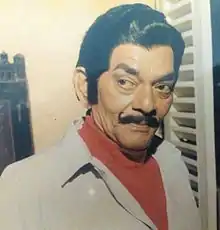Rajanala Kaleswara Rao
Rajanala Kaleswara Rao , popularly known as Rajanala, was an Indian film actor known for his works predominantly in Telugu cinema, Telugu theatre, and few Tamil, Kannada and Bollywood films. In a film career spanning more than forty years, Rajanala starred in more than four hundred feature films in a variety of characters. Regarded as one of the finest method actors, Rajanala was known for his gruesome portrayals of lead antagonist roles during the Golden age of Telugu cinema.The government of Andhra Pradesh and the film industry felicitated award for his achievement's and contribution to Indian Film Industry. He won several Film fare awards South and Nandi Award.[1][2] well known as numerous comedy roles such as in Jagadeka Veeruni Katha.
Rajanala Kaleswara Rao | |
|---|---|
 Rajanala in Hello Brother (1994) | |
| Born | Rajanala Kaleswara Rao Naidu 3 January 1925 Nellore, Andhra Pradesh, India |
| Died | 21 May 1998 (aged 73) Chennai, Tamil Nadu, India |
| Other names | Rajanala Kalayya King of Villains |
| Alma mater | University of Lucknow Andhra University |
| Occupation | Actor Thespian |
| Years active | 1950-1996 |
| Known for | Tenali Ramakrishna Narthanasala Gundamma Katha Dakshayagnam Chitti Tammudu Gulebakavali Katha Shri Krishna Pandaviyam Palnati Yudham |
| Spouse(s) | R. B. Devi |
| Awards | Andhra Pradesh State Nandi Awards |
Early life and characteristics
Rajanala was born on January 3, 1925 in Nellore, Andhra Pradesh, India. While working as a revenue inspector in Nellore from 1944–51 he made his entry into theatre. A post graduate in philosophy from University of Lucknow and a voracious reader of English literature. Before coming to Cinema, he won several awards and accolades for his acting in Theatre. He was a noted villain against N.T.Rama Rao, a versatile actor of Telugu filmdom at that time. Rajanala had well proportioned body, he also won MR. Madras for his Physique. Rajanala iconic acting was mostly through the movement of his eyes, he evince the cruelty by widening his eyes to various levels and his maniacal laughter was very famous.Rajanala potraited many villainous roles , in real life he was intellectual and divineful.Rajanala Kaleswara Rao, the first actor to star alongside three chief ministers, i.e. NT Rama Rao, M. G. Ramachandran and J Jayalalithaa, he also had good friends in other film industry Kollywood and Bollywood.[3][4]
Death
Being a diabetic, his right leg could not withstand the rigors of outdoor shooting in Araku valley in 1995 when he was playing a full-fledged role in Telugu Veera Levara. His leg which was injured during the shooting had to be amputated at Nizams Institute of Medical Sciences. Later Rajanala shifted to Chennai taken cared by his daughter and son in law who was a Businessman . Rajanala had severe cardiac arrest, was admitted in Vijaya Hospital in Chennai. He died on 21 May 1998 in Chennai.[1][5]
Selected filmography
- Pratigya (1953)
- Jayasimha (1955)
- Tenali Ramakrishna (1956)
- Suvarna Sundari (1957)
- Kutumba Gowravam (1957)
- Vinayaka Chaviti (1957)
- Manchi Manasuku Manchi Rojulu (1958)
- Pelli Sandadi (1959)
- Raja Makutam (1959)
- Sri Venkateswara Mahatyam (1960)
- Sahasra Siracheda Apoorva Chinthamani (1960)
- Usha Parinayam (1961)
- Jagadeka Veeruni Katha (1961)
- Taxi Ramudu (1961)
- Khaidi Kannaiah (1962)
- Siri Sampadalu (1962)
- Gulebakavali Katha (1962)
- Chitti Tammudu (1962)
- Dakshayagnam (1962)
- Gundamma Katha (1962)
- Swarna Manjari (1962)
- Paruvu Prathishta (1963)
- Bandipotu (1963)
- Narthanasala (1963)
- Guruvunu Minchina Sishyudu (1963)
- Ramudu Bheemudu (1964)
- Devatha (1964)
- Desa Drohulu (1964)
- Aggi Pidugu (1964)
- Bobbili Yudham (1964)
- Pandava Vanavasam (1965)
- Mangamma Sapadham (1965)
- C.I.D. (1965)
- Sri Simhachala Kshetra Mahima (1965)
- Dorikithe Dongalu (1965)
- Satya Harishchandra (1965)
- Jwala Dweepa Rahasyam (1965)
- Veerabhimanyu (1965)
- Shri Krishna Pandaviyam (1966)
- Pidugu Ramudu (1966)
- Palnati Yudham (1966)
- Goodachari 116 (1966)
- Sri Krishna Tulabharam (1966)
- Gopaludu Bhoopaludu (1967)
- Kanchu Kota (1967)
- Sri Sri Sri Maryada Ramanna (1967)
- Shri Krishnavataram (1967)
- Ave Kallu
- Farz (1967)
- Apoorva Piravaigal (1967)
- Rahasyam (1967)
- Tikka Sankaraiah (1968)
- Nene Monaganni (1968)
- Baghdad Gajadonga (1968)
- Ramu (1968)
- Bhagya Chakramu (1968)
- Varakatnam (1969)
- Gandikota Rahasyam (1969)
- Mooga Nomu (1969)
- Bhale Tammudu (1969)
- Saptaswaralu (1969)
- Raithu Bidda
- Suputhrudu (1971)
- Mattilo Manikyam (1971)
- Sri Krishnanjaneya Yuddham (1972)
- Doctor Babu (1973)
- Alluri Seetarama Raju (1974)
- Daana Veera Soora Karna (1977)
- Nakili Manishi (1980)
- Bobbili Puli (1982)
- Bhale Thammudu (1985)
- Number One (1994)
- Hello Brother (1994)
- Jailor Gaari Abbayi (1994)
Gallery
 Rajanala and wife
Rajanala and wife Rajanala with Nandamuri Balakrishna and Soundarya
Rajanala with Nandamuri Balakrishna and Soundarya Actress Manjula felicitate Rajanala at Vamsee Berkely Awards
Actress Manjula felicitate Rajanala at Vamsee Berkely Awards Rajanala and Akkineni Nagarjuna at Vamsee Berkely awards
Rajanala and Akkineni Nagarjuna at Vamsee Berkely awards kallayya
kallayya Rajanala and Kanta Rao
Rajanala and Kanta Rao Rajanala and N.T Rama Rao
Rajanala and N.T Rama Rao Rajanala and Jayalalitha
Rajanala and Jayalalitha Rajanala Duet Song
Rajanala Duet Song Rajanala and Krishna
Rajanala and Krishna Rajanala Photoshoot
Rajanala Photoshoot Rajanala Guest appearance
Rajanala Guest appearance


References
- "The original swashbuckler". The Hindu. 3 April 2009. Retrieved 15 July 2018.
- M.L. Narasimham (11 February 2016). "Rajamakutam (1960)". The Hindu. Retrieved 15 July 2018.
- M.L. Narasimham (9 July 2015). "Manchi manasuku manchi rojulu (1958)". The Hindu. Retrieved 15 July 2018.
- M.L. Narasimham (14 August 2014). "Jayasimha (1955)". The Hindu. Retrieved 15 July 2018.
- "Rajanala Kaleswara Rao Jayanthi Special - Video Dailymotion". Retrieved 15 July 2018.